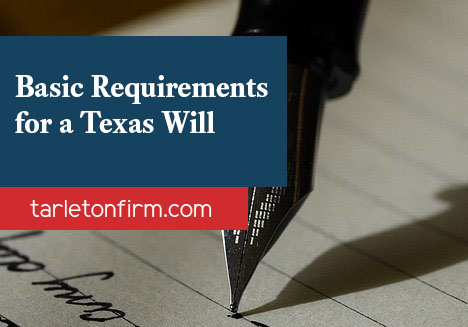 A Will is an important legal document that allows you to determine the beneficiaries of your estate at your death. It also provides for the manner and timing of the distribution of your property after your death, including deferring distributions with trusts.
A Will is an important legal document that allows you to determine the beneficiaries of your estate at your death. It also provides for the manner and timing of the distribution of your property after your death, including deferring distributions with trusts.
All states, including Texas, have legal requirements for making a valid Will to ensure that a document should be honored as your Will. This is, in part, because of the importance of a Will and because you will not be there to clarify whether a document is a Will or not. The legal requirements for a Will in Texas are primarily found under Texas Estates Code 251.001 and its interpretation under existing case law.
Under Texas law, a valid Will may only be made by someone meeting the requirements for legal capacity, mental capacity, and intent. In addition, there are specific “formalities” or technical requirements for how a Will is to be written and signed.
Mental Capacity (sound mind)
The person making a Will must be of “sound mind” to make a valid Will. This is also known as having “testamentary capacity”, and must be exhibited at the time the Will is executed. You may have a common-sense idea of what “sound mind” means, but for purposes of making a valid Will in Texas the legal standard is subjective. Courts have applied the following factors to determine whether a person had sound mind at the time of making a Will:
- You understand you are making a Will
- You understand the effect of making a Will
- You understand the general nature and extent of your property
- You know your next of kin and the natural objects of your bounty (the relatives you would normally be expected to favor in your estate plan)
- You have enough memory to collect in your mind all of the above elements long enough to make a reasonable judgment as to the disposition of your property (an “unnatural disposition” may be evidence of lack of capacity).
Legal Capacity (minimum age or status)
You must also have legal capacity to make a Texas Will, which is satisfied if you meet one of the following three categories:
- You are age 18 or above; OR
- You are or have been legally married; OR
- You are a member of the armed forces of the Unites states (or its auxiliaries or the US Maritime service).
Testamentary Intent
In addition to legal and mental capacity, you must intend that the document you are making be a Will and not used for some other purposes. This means that you want the document to govern how your property will be distributed upon your death, including a document that names an executor for your estate, and that the document should clearly express that desire.
Technical Requirements
A Texas Will must be in writing and the person making the Will (the “testator”) must sign it. An “oral Will” is not a valid Will in Texas.
There are two types of written Wills in Texas: holograph and attested.
A holographic Will is a handwritten Will, and must be entirely in in your own handwriting and signed by you. It does not require witnesses or a notary to sign the Will.
An attested Will is a Will that is not completely in your handwriting, usually a typewritten Will. This type of Will requires the signatures of two witnesses over the age of 14 to be valid, and the witnesses must sign it in your presence.
An additional option under Texas law is to make a Will “self-proved”. This helps the Will be submitted for probate without the witnesses having to appear in court and prove the facts surrounding the signing of the Will. A Will is made “self proved” by attaching an affidavit to the Will with the required language and that is also signed by the testator, witnesses, and a notary.
